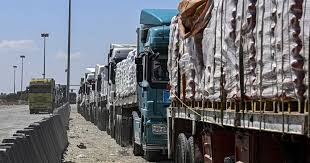
Breaking News
 Foreign globalist is upset that you've got 'untraceable cash' in your pocket…
Foreign globalist is upset that you've got 'untraceable cash' in your pocket…
 Donald Trump delivers West Point commencement speech
Donald Trump delivers West Point commencement speech
 Israel Supporters Turning AGAINST Netanyahu?
Israel Supporters Turning AGAINST Netanyahu?
Top Tech News
 New AI data centers will use the same electricity as 2 million homes
New AI data centers will use the same electricity as 2 million homes
 Is All of This Self-Monitoring Making Us Paranoid?
Is All of This Self-Monitoring Making Us Paranoid?
 Cavorite X7 makes history with first fan-in-wing transition flight
Cavorite X7 makes history with first fan-in-wing transition flight
 Laser-powered fusion experiment more than doubles its power output
Laser-powered fusion experiment more than doubles its power output
 Watch: Jetson's One Aircraft Just Competed in the First eVTOL Race
Watch: Jetson's One Aircraft Just Competed in the First eVTOL Race
 Cab-less truck glider leaps autonomously between road and rail
Cab-less truck glider leaps autonomously between road and rail
 Can Tesla DOJO Chips Pass Nvidia GPUs?
Can Tesla DOJO Chips Pass Nvidia GPUs?
 Iron-fortified lumber could be a greener alternative to steel beams
Iron-fortified lumber could be a greener alternative to steel beams
 One man, 856 venom hits, and the path to a universal snakebite cure
One man, 856 venom hits, and the path to a universal snakebite cure
 Dr. McCullough reveals cancer-fighting drug Big Pharma hopes you never hear about…
Dr. McCullough reveals cancer-fighting drug Big Pharma hopes you never hear about…
Israel proposes plan to screen Gaza aid recipients using facial recognition technology

During President Donald Trump's recent visit to Arab allies in the Gulf, Israeli Foreign Minister Gideon Saar publicly endorsed the 14-page proposal brokered under U.S. pressure. The move follows intense diplomatic efforts by the Trump administration, which has urged Israel to ease restrictions while maintaining pressure on Hamas. (Related: Aid groups: Israel blocks 83% of food aid to Gaza, triggering severe humanitarian crisis.)
"President Trump has made very clear that one of the most urgent things that needs to happen is humanitarian aid into Gaza, and he has tasked all of his team to do everything possible to accelerate that and to as expeditiously as possible get humanitarian aid in, to the people," said U.S. Ambassador to Israel Mike Huckabee.
The proposal would initially provide pre-packaged food, hygiene kits and medical supplies to only 60 percent of Gaza's 2.1 million residents, with distribution managed by a newly formed Swiss charity, the Gaza Humanitarian Foundation. Instead of using the existing network of around 400 United Nations (UN) distribution points, only four aid centers would be established in a southern "safe zone" controlled by Israeli forces, where displaced Palestinians must relocate to receive assistance.
However, this plan hinges on facial recognition technology to screen civilians and verify identities, a measure Israel claims will prevent Hamas members from accessing aid.
"It will enable aid to go directly to the people. Hamas must not be allowed to get their hands on it," Saar said in a separate announcement on May 11. Israeli soldiers "will not allocate aid. They will secure the perimeter."
Humanitarian groups and experts refuse to endorse Israel's U.S.-backed proposal
In line with the proposal, Saar has called on countries and aid groups to cooperate.
However, major aid groups, including the UN and its partners, have refused to participate, calling the proposal a violation of humanitarian principles. "It contravenes fundamental humanitarian principles and appears designed to reinforce control over life-sustaining items as a pressure tactic – as part of a military strategy," the United Nations and its aid partners in Gaza said in a joint statement. "We will not participate in any scheme that does not adhere to the global humanitarian principles of humanity, impartiality, independence and neutrality."
UN officials also disputed the Israeli claims that Hamas exploits aid deliveries by confiscating supplies, profiting from black market sales and using aid distribution to reinforce its control over Gaza. Instead, UN officials claimed there is no evidence of large-scale aid diversion in the region.
"The aid we coordinate goes to the people for whom it's intended," said Olga Cherevko of the UN Office for the Coordination of Humanitarian Affairs. "We have mechanisms in place that help mitigate this, including monitoring during and after distribution, hotlines to report incidents and our accountability to donors."

 The Crypto Apostles
The Crypto Apostles

